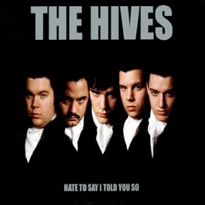This article needs additional citations for verification .(July 2011) |
| "Hate to Say I Told You So" | ||||
|---|---|---|---|---|
 | ||||
| Single by the Hives | ||||
| from the album Veni Vidi Vicious | ||||
| Released | 20 November 2000 | |||
| Recorded | 1999 [1] | |||
| Genre | Garage punk [2] | |||
| Length | 3:22 | |||
| Label | Burning Heart | |||
| Songwriter | Randy Fitzsimmons | |||
| Producer | Pelle Gunderfelt | |||
| The Hives singles chronology | ||||
| ||||
| Music video | ||||
| "Hate to Say I Told You So" on YouTube | ||||
"Hate to Say I Told You So" is the first single from Swedish rock band the Hives' second studio album, Veni Vidi Vicious . It was released as a single in Sweden on 20 November 2000 and was later released in several countries in 2002. It is considered by many as the Hives' signature song.[ citation needed ]
Contents
It was nominated for the Kerrang! Award for Best Single in 2002. In March 2005, Q placed it at number 54 in its list of the 100 Greatest Guitar Tracks. It also lists at 244 on Pitchfork's 's Top 500 songs of the 2000s (decade). In October 2011, NME placed it at number 84 on its list "150 Best Tracks of the Past 15 Years". [3]